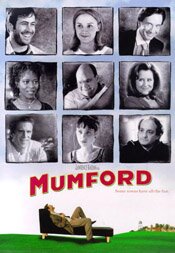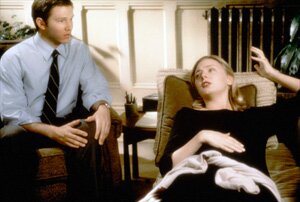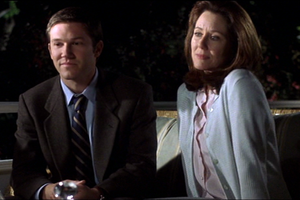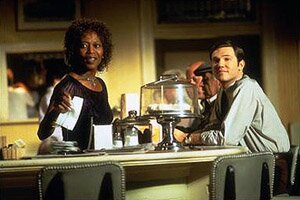Below I refer to John Sayles but maybe the movie Mumford is more like Lasse Hallstrom amused and charmed by a Norman Rockwell America. Whatever it is, and despite a few anachronisms, I still find this movie appealing. It has so many actors in it I’ve always liked. Part of its appeal may be that we don’t often see ensemble pieces like this anymore.
 Mumford (1999)
Mumford (1999)
Directed by Lawrence Kasdan
In 1999 writer-director Lawrence Kasdan gave us Mumford, a quiet comedy that was erroneously called “Capraesque.” I think it has a greater relationship to the movies of John Sayles than Capra. Think of a Sayles movie done as a low key comedy (I suppose the name Sayles already suggests “low key”).
Comparisons are misleading though. It’s similarity to either Capra or Sayles is essentially the fact it is an ensemble piece. But it lacks Capra’s frenetic quality. As for the movies of John Sayles, again its ensemble and it also uses some of the same actors, but it has a bit more Hollywood gloss than his films do (but not a lot).
This is a very long-winded way of saying Mumford is a low-key ensemble comedy. What I’ve yet to say is it’s very good. But the humour is often dry and if you don’t adjust to its tone and pace you may miss out on a quiet gem.

The town of Mumford has a psychologist who is also named Mumford (Loren Dean). He’s only been in town for about four months but already he has a great number of patients. He seems to have an uncanny ability to help people, primarily through his unthreatening manner. He’s easy to talk to because Doc Mumford has a knack for listening.
Doc also has a knack for seeming like a psychologist while also never quite responding like one.
With deadpan style, he questions and answers from left field, such as when one character asks what kind kind of doctor he is. He tells her he’s a psychologist and she replies something like, “So you’re not a real doctor.” He answers back, “That’s right. I’m the fake kind.”

As it turns out, almost everyone in Mumford has a secret life. There’s a pharmacist (Pruitt Taylor Vince) with detailed sexual fantasies rooted in the 1950’s pulp magazines.
There’s a housewife (Mary McDonnell), spouse of an ‘A’ personality business man (Ted Danson). She compulsively orders almost everything she sees in catalogues and magazines.
There’s a teenage girl (Zooey Deschanel) who is caught up in the world portrayed in fashion magazines. And there’s the wealthy technology savant (Jason Lee) on whom the town relies – he has trouble finding an honest companion so he tries inventing one.
They all share in common one quality: loneliness.
Then there’s the young woman who appears to suffer from chronic fatigue syndrome (Hope Davis). The doctor soon finds himself falling in love with her.

The movie is warmly amusing as we’re introduced to all these characters who inhabit Mumford, the town. They all have a secret life. However, as we soon learn, the doctor has a secret life too.
In the short time he has been in Mumford, he has fashioned an idyllic life. He’s become an integral and loved part of the community. But his own secret threatens to be revealed and, with it, everything he has gained since arriving.
It probably doesn’t read as very exciting and, in some ways, it’s not. The charm of the movie isn’t in its ability to pump adrenaline — it’s not that kind of movie. It’s in the relationships of the characters and how those characters interact. It’s certainly a sentimental movie but I didn’t find it excessive in this regard. Someone more cynical might find it that way but … well, there are more than enough dark movies out there to keep them happy.
It’s also true to say nothing really happens in the film. But again, it’s not about something happening so much as it’s about characters interacting. It’s a fantasy — the town and the situation — but, as with most fantasies, it has a fable quality.
I suppose you could say the movie is about our secrets and how they get in the way of fully realizing the potential of our lives, and of how the secrets seem more large and threatening to ourselves than they do to anyone else. In other words, there really isn’t much cause to keep them secrets.
In the end, I guess the movie does have a Capra quality in that the film has a message and, like Capra, it’s a pretty simple, folk wisdom one. It also shares in common with Capra’s films an ensemble of eccentric yet lovable characters.
Done well, warm, sweet movies can achieve what they attempt — make you feel good. And Mumford does this. Kasdan is well known for his dialogue and in Mumford it’s on full display. It’s extremely well written. You get the most out of the film if, like Doc Mumford, you make an effort and listen.


